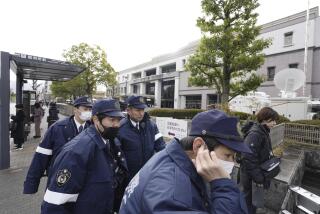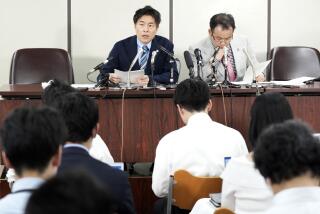Victims Say He Has Blood on His Hands
- Share via
TOKYO — When the judge read the “not guilty” verdict in Tokyo District Court Room 104 this week, a shock wave hit the gallery and quickly spread across the nation. Takeshi Abe, a powerful doctor suspected of playing a key role in one of the greatest medical scandals in Japanese history, had been absolved of all responsibility.
Prosecutors had accused Abe of knowingly prolonging Japan’s use of unheated blood products in the 1980s, ultimately resulting in the AIDS deaths of hundreds of hemophiliacs.
“I couldn’t believe what I was hearing,” said Ryuhei Kawada, 26, a hemophiliac sitting in the court gallery, who is infected with HIV, the human immunodeficiency virus that causes AIDS.
Japanese courts have a long history of protecting the powerful, and their decisions often are greeted with resignation. After Wednesday’s ruling, however, victims, social activists and legislators voiced frustration and outrage.
“This decision undermines trust in the Japanese legal system and shows just how removed the judges are from the real world,” said Satoru Ienishi, a lawmaker and HIV-positive hemophiliac, who said his office was inundated with calls after the announcement. “Under a U.S. jury system, Abe would be guilty of murder.”
For Japanese AIDS and HIV sufferers, this is only the latest setback. As AIDS spread globally in the early 1980s, nearly 1,500 Japanese hemophiliacs were infected with HIV before Japan followed other countries in banning unheated blood products in late 1985.
It took 10 more years before the government admitted responsibility. So far, 500 of those infected have died of AIDS-related complications.
At the time, Abe was Japan’s leading expert on hemophilia and a top Health Ministry advisor with broad policy authority. He also enjoyed cozy ties with four Japanese drug companies that held large stocks of untreated blood products and sought to block safer foreign-made products from entering the market. It was later revealed that the drug-makers had donated $830,000 to Abe’s research foundation.
In 1996, prosecutors charged Abe with criminal negligence on behalf of one of his now-dead patients. During the 4 1/2-year trial, Abe and his attorneys countered that the 84-year-old doctor bore no responsibility because he wasn’t aware of the danger. “If I’m accused of a crime, so too are all hemophilia doctors worldwide,” Abe said several years ago.
The three-judge panel ultimately agreed, despite evidence that Abe had given speeches, attended international conferences and chaired policy meetings as early as 1982 in which the deadly link between HIV infection and untreated blood was clear--and that Abe knew by 1984 that as many as half of his patients had tested HIV-positive.
Abe could not be reached for comment, but lead attorney Junichiro Hironaka told reporters that the finding was appropriate.
For Kawada and Ienishi, the ruling is anything but appropriate. Kawada, who was told at age 10 that he was HIV-positive, thought he would die within a few years.
As he read more about the disease, his anger grew until he became the first victim to go public with the allegations in 1995. “We’re not simply dying,” he told the nation. “We’re being murdered one by one.”
For Ienishi, the first inkling that something was wrong came in 1983 when he started hearing reports about the risks of untreated blood products. Concerned, he approached Health Ministry officials but was told that there was no cause for worry.
Four years later, when he learned that he was indeed infected with HIV, he remembered the officials’ arrogance. “I was filled with unspeakable anger,” he said. “All I could think of was how they had ignored me, and I was paying the price.”
Kawada and Ienishi say a positive result of this episode is that the Japanese have started questioning their government, demanding more accountability and electing more conscientious lawmakers.
“There’s a real problem with the Japanese system--it ignores the voices of average citizens,” Ienishi said. “But people are getting to the point where they can’t stand it anymore. I think we’re at a real turning point.”
More to Read
Sign up for Essential California
The most important California stories and recommendations in your inbox every morning.
You may occasionally receive promotional content from the Los Angeles Times.










